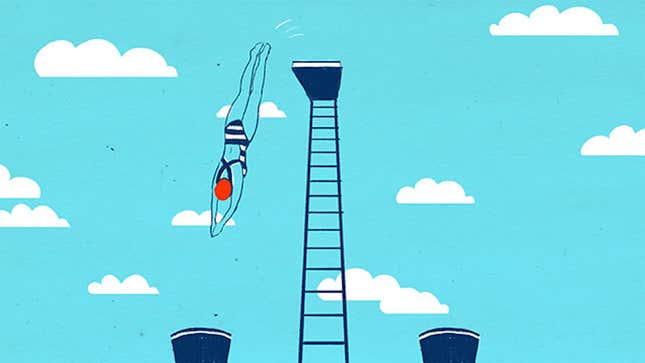The Right Way to Make a Hard Choice: Just Pick Something and Relax
Latest

The bigger the choice, the more importance we attribute to it. We assume that every choice—every time we have to weigh facts and feelings in an attempt to arrive at the Right Thing to Do—contains a right outcome and a wrong outcome. But what if big choices don’t have to be harder than small ones? And what if there is no such thing as an objectively correct Right Thing to Do in most of these cases anyway?
That is the essence of a recent NYT op-ed by Ruth Chang, a philosophy prof at Rutgers who studies and teaches about the value of choice. In it, she argues that hard choices are hard not—as we tend to assume—because there are so many important aspects to consider. Hard choices are often hard because the options have similar value. Not the same value, but similar value, or what Chang calls “on a par.”
Take Eve, a hypothetical chooser Chang uses to illustrate a point:
Eve works as a textbook editor at a Boston publishing house and was approached by a small but prestigious imprint on the West Coast that was looking for a fiction editor. The job would be a big promotion, with a significant raise, and Eve had always wanted to work in fiction.
But Eve is in crisis. Should she move her husband and young daughter from their cozy life in Boston, her home of 15 years, to the wilds of California? If she stays, will she be forsaking the opportunity of a lifetime? If she moves, will her new boss turn out to be a jerk? Will her child be bullied at school? What if her husband can’t find a good job? Will the family quarrel, the marriage dissolve, her boss fire her for being incompetent, and she and her child end up on food stamps in a homeless shelter?
Here, Eve is trying to identify the objectively better choice, the with a higher value. But she should be putting her energy into trying to figure out what type of person she is, or wants to be.
There are objective benefits and drawbacks to Boston and California, to be sure. But as no one can predict a decision’s trickle-down effect, but what makes one option better or worse for Eve hinges on whether she is better suited to staying put or setting up new stakes, to playing it safe, or adventuring. In other words, is Eve the sort of person who could move to California and make a go of it, understanding all that risk?
-

-

-

-

-

-

-

-

-

-

-

-

-

-

-

-

-

-

-

-

-

-

-

-

-

-

-

-

-

-

-

-

-

-

-

-

-

-

-

-








































